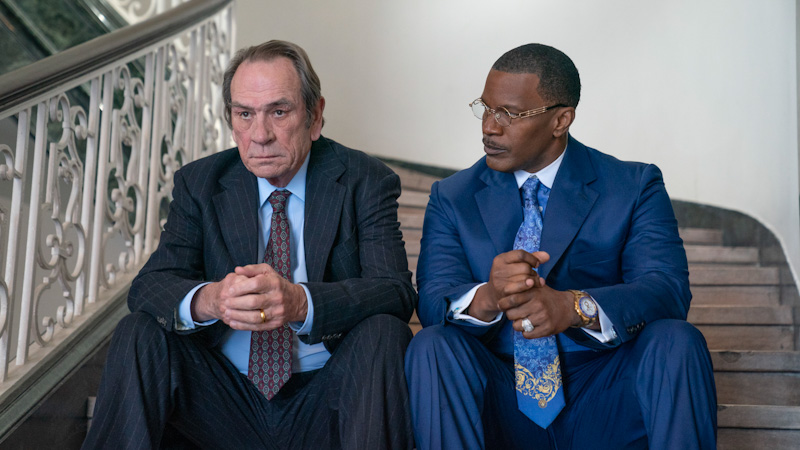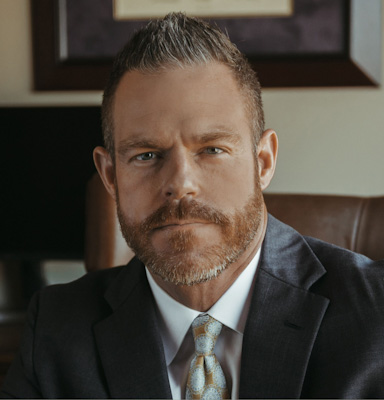Truth-Selective: 'The Burial' illustrates honesty in trial work

Tommy Lee Jones stars as Jeremiah O’Keefe, and Jamie Foxx stars as Willie E. Gary in The Burial. Photo from MovieStillsDB.
First and foremost, let’s get this out of the way: The Burial is very entertaining. As a trial attorney, I found the 2023 legal drama, available on Amazon Prime Video, enjoyable, with definite hints of authenticity. Still, the need for overdramatized courtroom scenes sometimes overshadowed those nuggets.
The story focuses on the real-life story of funeral home owner Jeremiah O’Keefe, played by Tommy Lee Jones, and his business, which is in financial distress because of the demands of the Mississippi state insurance commission. O’Keefe tries to sell some of the company to the Loewen Group to pay his debts, but the deal is never finalized, creating even greater financial problems. O’Keefe files a breach of contract lawsuit and eventually convinces big-shot personal injury attorney Willie E. Gary, played by Jamie Foxx, to represent him.
I’m a huge Jamie Foxx fan; he’s one of the most talented entertainers of our generation. Even still, the balance of flair and tenacity that he brought to his trial attorney portrayal was more impressive than I initially anticipated.
Nevertheless, I too often found myself watching counsel question witnesses in ways that would never play out in court. Some of the most exciting moments happen during cross-examination; however, some moments were more akin to closing arguments than relevant questions designed to elicit testimony.
But even considering the sometimes-unbelievable trial sequences, The Burial offers various takeaways for practitioners, including being truthful, always, with an eye toward what can sometimes be left unsaid.
Speaking with clients
In the film, when Gary and his associate first meet with O’Keefe and his current counsel, Gary is upfront about the fact that there are various reasons why he is not interested in accepting the case, including the issue that he doesn’t practice in that area of law. But ultimately, Gary reveals that that the main reason for his hesitance is related to an evaluation of what a judgement—or lack thereof—could pocket him.
His initial explanation is sound and reasonable without belittling the worth of O’Keefe’s case. As my wife often reminds me, you don’t have to say everything on your mind to be truthful. Sometimes it’s better to keep some of your reasoning to yourself. But still, there can be a fine line between being so honest that you hurt someone and being truthful enough to honestly relay your position. You have to be careful when being truth-selective.
Speaking with opposing counsel
In no way, shape or form am I advising attorneys to mislead people. But as any good litigator knows, a certain amount of gamesmanship goes into crafting your case and adequately arguing it to a fact finder. I hate to phrase it that way; after all, in my criminal defense practice, we’re dealing with people’s lives and liberty. It’s not a “game.” But I owe it to my clients to let them know that some prosecutors see it that way, so at times, I have to view the case through the same prism and play by those same rules.
As such, one of the basic tenets of communicating with an adversary is knowing how far you can trust them. There are plenty of prosecutors, ones I have dealt with for well over a decade, with whom I feel comfortable laying most, if not all, of my cards on the table. I respect their reasonableness and honor their truthfulness, and I may decide to give them what I have, in hopes of reaching a fair resolution.
There are other attorneys I’ve dealt with I don’t know so well or perhaps have concerning reputations. I may be a little more guarded in my communications with them. I won’t lie, but there’s a difference between “lying” and refraining from volunteering information that no one has asked for. Certain aspects of your case must be kept close to the cuff to maximize their effect, and that played out through each attorney’s approach in the film.
In the film, when Gary makes the impulsive decision to call O’Keefe to testify on his behalf earlier than anticipated, the opposing counsel is able to impeach O’Keefe’s character by insinuating that his financial struggles stem from his prior business dealings with now-convicted felon. The attorney had no duty to disclose this impeachment evidence, as she didn’t know that Gary would open the door to O’Keefe’s character.
This plays out in actual practice with impeachment evidence. Like I tell prosecutors when the issue becomes contentious: “If you give me a list of all the lies your witness is going to tell, I’ll give you a list of all the ways I can attack their credibility.”
That’s why having an open dialogue with your opposing counsel outside the courtroom is essential. Feelings will fly, and tempers will flare while court is in session. It’s important to step back and remove yourselves from the emotional aspect of your case to achieve what’s best for your client.
Speaking with the jury
We’re rarely treated to cinematic attorneys selecting juries, and The Burial is no different. But I’d be remiss to refrain from discussing the process. It’s a vital part of trial and not just because it presents an opportunity to find jurors who will benefit your position. It’s the only time you get to talk with the jury members in a somewhat-informal fashion.
I’m at my best in jury selection when I’m having an informal conversation. I cut out the legalese and simply speak to the group in a way I’d want to be spoken to. I might make a lighthearted joke here or there, but I’m also acutely aware I’m not a stand-up comedian. I break the issues in my case down to a very elementary level and employ commonsense analogies that help the potential jurors understand otherwise-complicated points of law they will encounter.
And once again, I’m honest. I try to genuinely be myself. I firmly think that jurors can tell whether you are putting on a show, and they rarely take kindly to it. And if they think that they can’t trust you, then it doesn’t matter how well that you close the case.
This is where Gary hits his high note. Early in the film, there is a segment in which he speaks with a jury during trial. It’s hard to tell whether it’s an opening or a closing, but the fact remains: Gary explains that he thinks that the opposing counsel is trying to talk over their heads, so he explains that he wants to just “talk” to them “simple.”
He reiterates that in his closing during O’Keefe’s jury trial. It works.

Adam Banner
Adam R. Banner is the founder and lead attorney of the Oklahoma Legal Group, a criminal defense law firm in Oklahoma City. His practice focuses solely on state and federal criminal defense. He represents the accused against allegations of sex crimes, violent crimes, drug crimes and white-collar crimes.
The study of law isn’t for everyone, yet its practice and procedure seems to permeate pop culture at an increasing rate. This column is about the intersection of law and pop culture in an attempt to separate the real from the ridiculous.
This column reflects the opinions of the author and not necessarily the views of the ABA Journal—or the American Bar Association.



